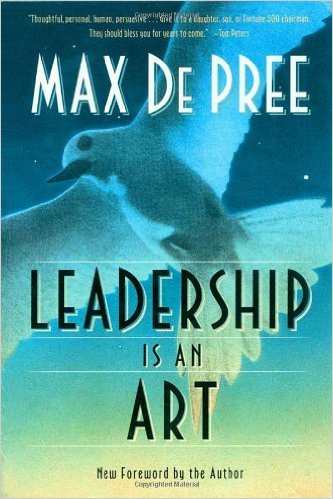“The first responsibility of a leader is to define reality. The last is to say thank you. In between the two, the leader must become a servant and a debtor”. Max De Pree, Leadership Is An Art
 This is my favorite quote from the book Leadership is an Art. It is an attempt by the author to answer the rather large question, what is leadership?
This is my favorite quote from the book Leadership is an Art. It is an attempt by the author to answer the rather large question, what is leadership?
The thing I love about this quote is that it’s so utterly true. It is the first concise description that I’ve found that explains, wholly and completely the beginning and end of what a leader is most responsible for. If they can just do these things, everything else will fall into place.
I was recently turned onto the book Leadership is an Art, when I was in a meeting. The man I was meeting with told me, “I’ve been reading your blogs on leadership — have you heard of Leadership is an Art?” I walked away from the meeting with a short handout from the book, which immediately peaked my interest.
Max De Pree’s input on leadership is definitely worth sharing. For those of you that might want to read the book in full, you can find it here on Amazon (definitely worth a read). I also thought I’d review a summary of Leadership Is An Art, and offer some of his incredibly poignant quotes on leadership along the way.
Measure Your Leadership On The Quality Of Your Followers
I don’t mean social media followers. I mean those you lead, those you mentor.
The goal of being a great leader is not, in and of itself, to be a great leader. The measure of good leadership, De Pree, explains, is in the quality of the body of people that follow him.
“The signs of outstanding leadership appear primarily among the followers. Are the followers reaching their potential? Are they learning? Serving? Do they achieve the required results? Do they change with grace? Manage conflict?”
How are your followers doing in this arena? And what more can you be doing for them to help?
This is in contrast to the outdated school of thought that leaders exist to lead. Instead, De Pree asks us to think of leaders as servants.
“Leaders don’t inflict pain; they bear pain”.
Leaders Owe 6 Things To Their Institutions
“Leadership is a concept of owing certain things to an institution”, De Pree explains.
When a leader leaves their role, they owe certain things to their institution to be left in their wake — the measure of these things is the measure of their good leadership.
Here’s what he explains, you must leave in your wake as a leader.
Assets
At a minimum, leaders owe their institutions vital financial health. This often takes the form of assets that are left in their wake. Assets can take many forms: in the most simple and tangible forms, they are the “services, products and equipments that people in the organization need to be accountable.”
If you work for a manufacturing company, this is the production lines on your manufacturing floor and the CRM system that your sales people use. It is the website that your marketing department manages and your accounting system that your financial team uses.

It’s how people will continue to function on a day to day basis once you are no longer there.
Legacy
Outside of the physical assets left behind, good leaders also leave a legacy in their wake. This is a part of being accountable for their people.
“Leaders can decide to be primarily concerned with leaving assets to their institutional heirs or they can go beyond that and capitalize on the opportunity to leave a legacy, a legacy that takes into account the more difficult, qualitative side of life, one which provides greater meaning, more challenge and more joy in the lives of those whom leaders enable”, Dee Pree says.
Part of building a legacy is developing future leadership. They need to identify, develop, and nurture the next generation of leaders.
Momentum
Leaders are responsible for maintaining momentum — the feeling of moving forward.
“Momentum in a vital company is palpable. It is not abstract or mysterious. It is the feeling among a group of people that their lives and work are intertwined and moving towards a recognizable and legitimate goal. Momentum comes from a clear vision of what the corporation ought to be.”

The ability to maintain that momentum comes from a clear strategy that must be spelled out; a strategy that must be carefully crafted and communicated to each department. The extent to which people can both participate and become accountable depends on how clearly the original strategy is crafted and communicated.
De Pree explains how each department has it’s own role in maintaining this forward motion within a company:
“Momentum depends on a pertinent but flexible research and development program led by people with outstanding gifts and unique talents. Momentum results when a corporation has an aggressive, professional, inspired group of people in its marketing and sales units. Momentum results when the operations group serves its customers in such a way that the customer sees them as their best supplier of tools, equipment, and services [or food!]. Underlying these complex activities is the essential role of the financial team.”
Effectiveness
Leaders are responsible for effectiveness, which De Pree explains is not the same thing as efficiency:
“Efficiency is doing the thing right, [while] effectiveness is doing the right thing.”
Therefore, leaders must be personally responsible for driving the feeling of the company “doing the right thing” in all aspects — doing the right thing for the customer, for their employees, and as a result, for themselves.
The hard part, De Pree explains, is understanding how to do the right thing for the organization. Two ways he says you can understand and achieve effectiveness: enable others to reach their potential (both their personal and their corporate potential), and understand who should be listened to and when. This latter topic requires that leaders must assess capability, and must be a judge of people, so that it’s possible for people to use their gifts to the fullest benefit of everyone.
Civility
Leaders must take a role in developing, expressing and defending civility and values — this civility typically takes the form of respect for others, good manners, and an appreciation for the way that people are serving each other within the organization.
Leaders, to be able to do this, need to be sure of themselves and understand their own place in the world. It is this emotional health that will allow them to work in a loving way with others without (to put it crudely) sucking the air out of the building.
“Leaders owe a certain maturity. Maturity as expressed in a sense of self worth, a sense of belonging, a sense of expectancy, a sense of responsibility, a sense of accountability, and a sense of equality.”
This sense of self is what is required as a baseline to even start to becoming a good leader in the long run.
“Leaders owe the corporation rationality”.
This rationality is what brings understanding and reason to the different relationships and programs within the corporations. An understanding of the economics of doing business is essential — this rationality is how you understand what you are building with your colleagues, what you are trying to accomplish, and how can you improve.
Last but not least, leaders also owe their people space — the emotional and intellectual freedom to explore their gifts, to grow, to become better, or as we put it here at Centra Foods, “to find their right seat on the bus”.
Values
De Pree purports that leaders owe it to their people to be concerned with the “institutional value system” — the values found inside the organization. It is these values, after all, which guide the practices of the people.
Leaders owe it to all of their people to offer a clear statement of the values that the organization will function on. And this should not be only stated in words, but in action, day in and day out, through small daily interactions.
“Leaders owe a clear statement of the values of the organization. These values should be broadly understood and agreed to and should shape corporate and individual behavior.”
Leaders are also responsible for nurturing the roots of an organization and building a culture of quality — for example, is the institution open to influence and change? Are the leaders encouraging the sharing of contrary opinions, which De Pree claims are an important source of vitality?
In Conclusion
I will conclude with how De Pree begins:
“Leadership is an art, something to be learned over time, not simply by reading books. Leadership is more tribal than scientific, more weaving of relationships than amassing of information.”
So get back out there and keep practicing your leadership skills within your relationships.
Information Source: All quotes taken from Leadership As An Art.
Topics: Business & Leadership












